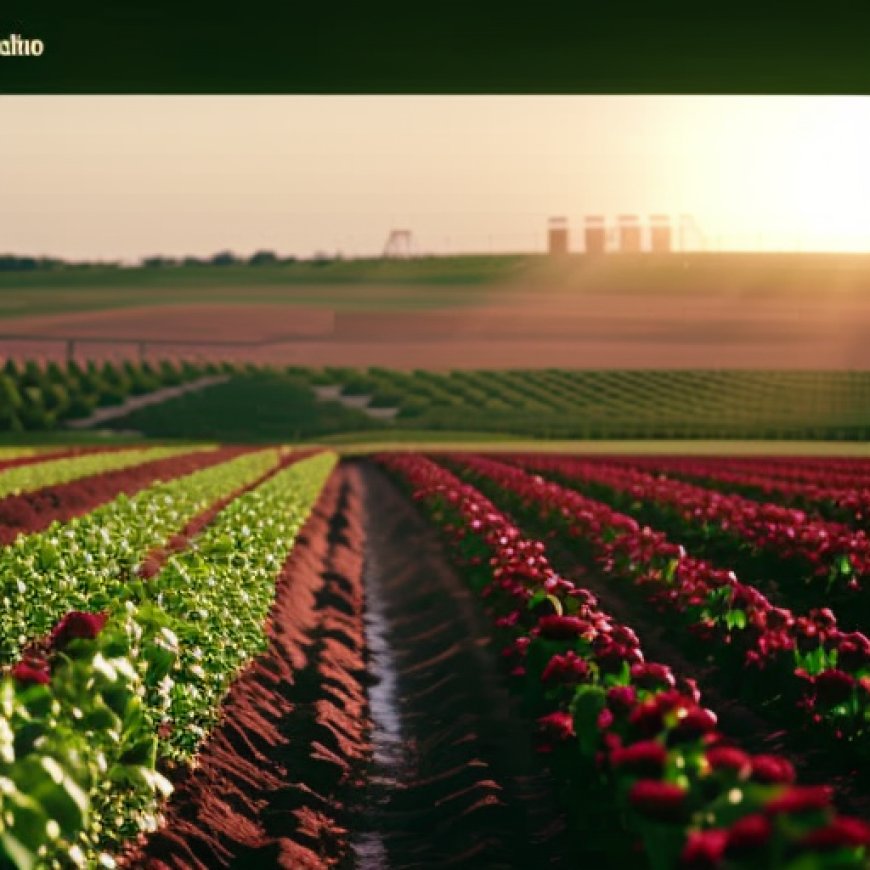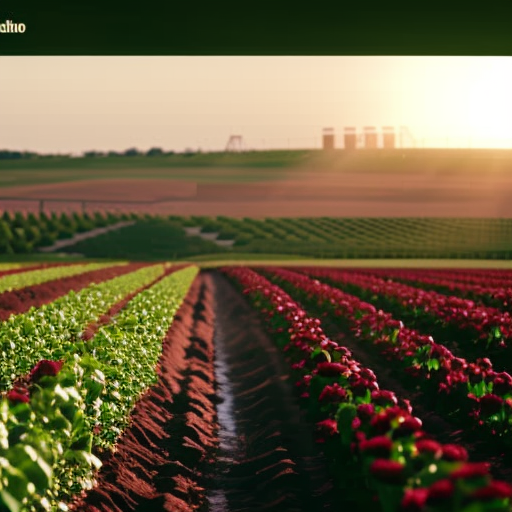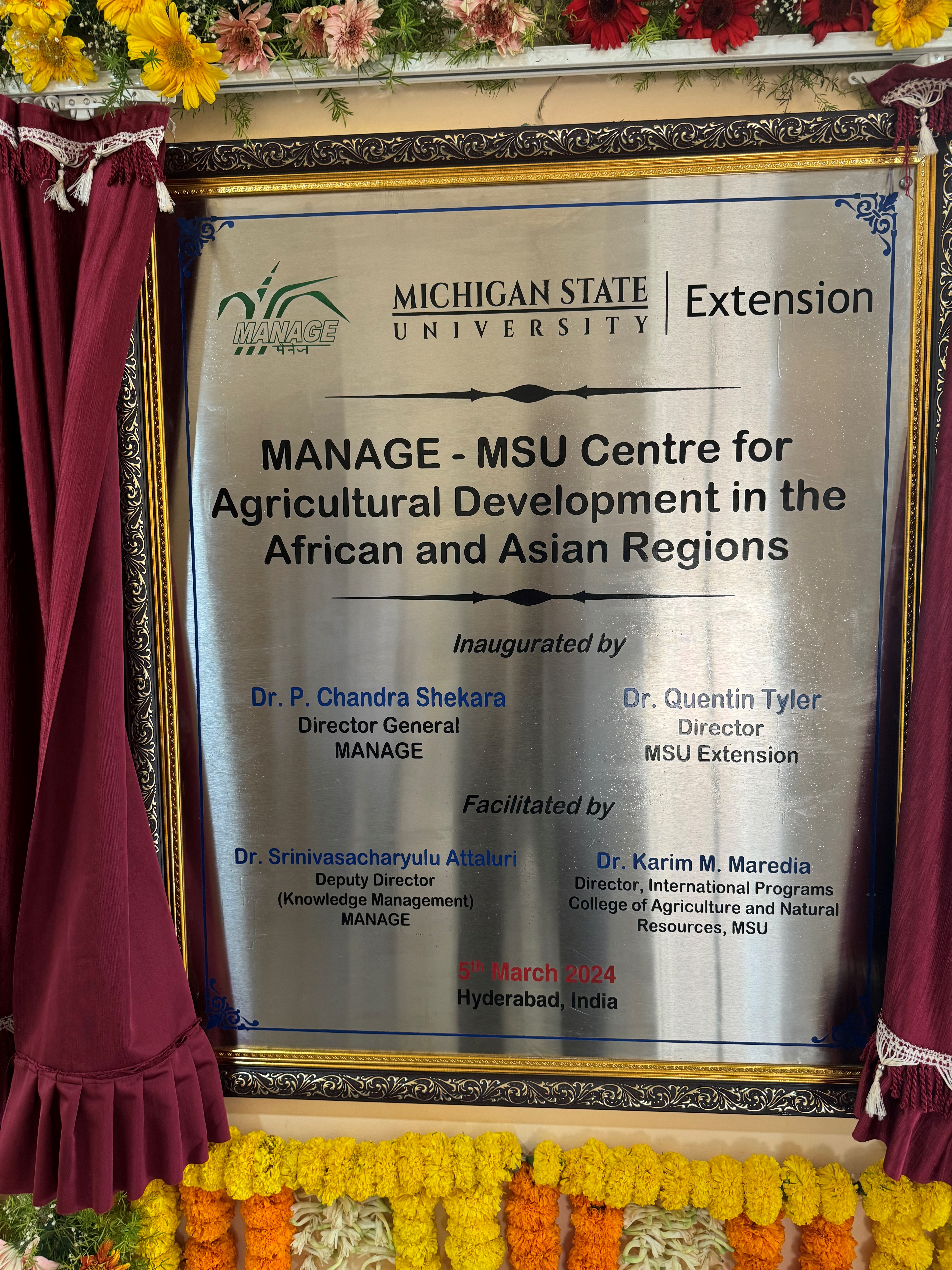MSU Extension launches global agricultural education partnership with India-based organization to better serve Africa and Asia
MSU Extension launches global agricultural education partnership with India-based organization to better serve Africa ... Michigan State University


MSU Extension launches global agricultural education partnership with India-based organization to better serve Africa and Asia
This partnership will launch the Centre for Agricultural Development in the African and Asian Regions, serving as a platform for capacity-building in developing countries.
Introduction
Michigan State University (MSU) Extension has partnered with India’s National Institute of Agricultural Extension Management (MANAGE) to launch the Centre for Agricultural Development in the African and Asian Regions. The Centre will serve as a platform for capacity-building in developing countries, including promoting good agricultural practices to empower farmers and encourage agricultural entrepreneurship and innovations.
Objectives
Karim Maredia, director of international programs for the MSU College of Agriculture and Natural Resources, said that Centre will be a game-changer for farmers and agribusinesses in these regions.
“MSU’s goal is to diffuse good management and business practices across the globe,” he said. “Working together with MANAGE, this Centre will help make this goal a reality in the ag sector by offering policy support to promote agricultural development in areas that have sometimes struggled to feed their growing populations.”
Global Perspective
Quentin Tyler, director of MSU Extension, has travelled to India with colleagues twice to continue to expand the initial partnership with MANAGE. He believes the opportunities to address agriculture’s most wicked problems can come from looking at them through a global lens.
“Climate variability, technology, labor and access to markets are universal challenges,” Tyler said. “Bringing diverse minds from different cultures together is helping us lean into our mission of improving individuals, families, businesses, communities and countries through education. Looking at familiar problems in an unfamiliar territory helps us broaden our view. We have learned a lot by looking at how others tackle these issues, and we bring that knowledge home to Michigan to help local farmers.”
Centre for Agricultural Development

P. Chandra Shekara, director general of MANAGE, hosts the Centre in Hyderabad, capitol of the Indian state of Telangana.
“This is a milestone achievement in the partnership journey of MANAGE and MSU Extension,” he said. “We envision that this Centre will address the challenges of smallholder farmers in developing countries with global expertise.”
Collaborative Learning
“We’re proud of Michigan State University’s status as a historical leader in agricultural research and Extension – and the farmers in India are forging new paths forward in cutting-edge agritech,” said Kelly Millenbah, dean of the College of Agriculture and Natural Resources at MSU. “I’m excited to see what we can learn from one another.”
About MSU Extension
MSU Extension is the outreach arm of Michigan State University. With more than 600 professionals throughout the state, the organization helps address critical issues, needs and opportunities by delivering the vast knowledge resources of MSU directly to individuals, communities and businesses.
Conclusion
This partnership between MSU Extension and MANAGE aims to contribute to the achievement of the Sustainable Development Goals (SDGs), particularly Goal 2: Zero Hunger, Goal 8: Decent Work and Economic Growth, and Goal 17: Partnerships for the Goals. By promoting good agricultural practices, empowering farmers, and fostering agricultural entrepreneurship and innovations, the Centre for Agricultural Development in the African and Asian Regions will play a crucial role in improving food security, enhancing economic opportunities, and strengthening global collaborations.
Did you find this article useful?
SDGs, Targets, and Indicators
-
SDG 2: Zero Hunger
- Target 2.3: By 2030, double the agricultural productivity and incomes of small-scale food producers, in particular women, indigenous peoples, family farmers, pastoralists, and fishers, including through secure and equal access to land, other productive resources and inputs, knowledge, financial services, markets, and opportunities for value addition and non-farm employment.
- Indicator 2.3.1: Volume of production per labor unit by classes of farming/pastoral/forestry enterprise size.
-
SDG 4: Quality Education
- Target 4.7: By 2030, ensure that all learners acquire the knowledge and skills needed to promote sustainable development, including, among others, through education for sustainable development and sustainable lifestyles, human rights, gender equality, promotion of a culture of peace and non-violence, global citizenship, and appreciation of cultural diversity and of culture’s contribution to sustainable development.
- Indicator 4.7.1: Extent to which (i) global citizenship education and (ii) education for sustainable development (including climate change education) are mainstreamed in (a) national education policies; (b) curricula; (c) teacher education; and (d) student assessment.
-
SDG 8: Decent Work and Economic Growth
- Target 8.3: Promote development-oriented policies that support productive activities, decent job creation, entrepreneurship, creativity, and innovation, and encourage the formalization and growth of micro-, small-, and medium-sized enterprises, including through access to financial services.
- Indicator 8.3.1: Proportion of informal employment in non-agriculture employment, by sex.
-
SDG 17: Partnerships for the Goals
- Target 17.6: Enhance North-South, South-South, and triangular regional and international cooperation on and access to science, technology, and innovation and enhance knowledge sharing on mutually agreed terms, including through improved coordination among existing mechanisms, particularly at the United Nations level, and through a global technology facilitation mechanism.
- Indicator 17.6.1: Number of science and/or technology cooperation agreements and projects between countries.
Table: SDGs, Targets, and Indicators
| SDGs | Targets | Indicators |
|---|---|---|
| SDG 2: Zero Hunger | Target 2.3: By 2030, double the agricultural productivity and incomes of small-scale food producers, in particular women, indigenous peoples, family farmers, pastoralists, and fishers, including through secure and equal access to land, other productive resources and inputs, knowledge, financial services, markets, and opportunities for value addition and non-farm employment. | Indicator 2.3.1: Volume of production per labor unit by classes of farming/pastoral/forestry enterprise size. |
| SDG 4: Quality Education | Target 4.7: By 2030, ensure that all learners acquire the knowledge and skills needed to promote sustainable development, including, among others, through education for sustainable development and sustainable lifestyles, human rights, gender equality, promotion of a culture of peace and non-violence, global citizenship, and appreciation of cultural diversity and of culture’s contribution to sustainable development. | Indicator 4.7.1: Extent to which (i) global citizenship education and (ii) education for sustainable development (including climate change education) are mainstreamed in (a) national education policies; (b) curricula; (c) teacher education; and (d) student assessment. |
| SDG 8: Decent Work and Economic Growth | Target 8.3: Promote development-oriented policies that support productive activities, decent job creation, entrepreneurship, creativity, and innovation, and encourage the formalization and growth of micro-, small-, and medium-sized enterprises, including through access to financial services. | Indicator 8.3.1: Proportion of informal employment in non-agriculture employment, by sex. |
| SDG 17: Partnerships for the Goals | Target 17.6: Enhance North-South, South-South, and triangular regional and international cooperation on and access to science, technology, and innovation and enhance knowledge sharing on mutually agreed terms, including through improved coordination among existing mechanisms, particularly at the United Nations level, and through a global technology facilitation mechanism. | Indicator 17.6.1: Number of science and/or technology cooperation agreements and projects between countries. |
Analysis
The issues highlighted in the article are connected to multiple Sustainable Development Goals (SDGs) and their corresponding targets and indicators. The identified SDGs include:
SDG 2: Zero Hunger
The article discusses the partnership’s goal of promoting good agricultural practices to empower farmers and encourage agricultural entrepreneurship and innovations. This aligns with SDG 2, which aims to end hunger, achieve food security, improve nutrition, and promote sustainable agriculture.
SDG 4: Quality Education
The article mentions the partnership’s focus on capacity-building and education for sustainable development. This relates to SDG 4, which aims to ensure inclusive and equitable quality education and promote lifelong learning opportunities for all.
SDG 8: Decent Work and Economic Growth
The article emphasizes the promotion of entrepreneurship, job creation, and access to financial services. These objectives align with SDG 8, which aims to promote sustained, inclusive, and sustainable economic growth, full and productive employment, and decent work for all.
SDG 17: Partnerships for the Goals
The article highlights the partnership between MSU Extension and MANAGE as a global collaboration to address agricultural challenges. This aligns with SDG 17, which aims to strengthen global partnerships for sustainable development.
Based on the article’s content,
Behold! This splendid article springs forth from the wellspring of knowledge, shaped by a wondrous proprietary AI technology that delved into a vast ocean of data, illuminating the path towards the Sustainable Development Goals. Remember that all rights are reserved by SDG Investors LLC, empowering us to champion progress together.
Source: canr.msu.edu

Join us, as fellow seekers of change, on a transformative journey at https://sdgtalks.ai/welcome, where you can become a member and actively contribute to shaping a brighter future.







